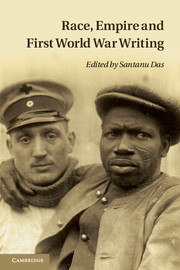Book contents
- Frontmatter
- Contents
- List of illustrations
- Acknowledgements
- Notes on contributors
- Introduction
- PART I VOICES AND EXPERIENCES
- PART II PERCEPTIONS AND PROXIMITIES
- 6 Representing Otherness: African, Indian and European soldiers' letters and memoirs
- 7 Living apart together: Belgian civilians and non-white troops and workers in wartime Flanders
- 8 Nursing the Other: the representation of colonial troops in French and British First World War nursing memoirs
- 9 Imperial captivities: colonial prisoners of war in Germany and the Ottoman empire, 1914–1918
- 10 Images of Te Hokowhitu A Tu in the First World War
- PART III NATIONALISM, MEMORY AND LITERATURE
- Index
- References
6 - Representing Otherness: African, Indian and European soldiers' letters and memoirs
Published online by Cambridge University Press: 05 February 2014
- Frontmatter
- Contents
- List of illustrations
- Acknowledgements
- Notes on contributors
- Introduction
- PART I VOICES AND EXPERIENCES
- PART II PERCEPTIONS AND PROXIMITIES
- 6 Representing Otherness: African, Indian and European soldiers' letters and memoirs
- 7 Living apart together: Belgian civilians and non-white troops and workers in wartime Flanders
- 8 Nursing the Other: the representation of colonial troops in French and British First World War nursing memoirs
- 9 Imperial captivities: colonial prisoners of war in Germany and the Ottoman empire, 1914–1918
- 10 Images of Te Hokowhitu A Tu in the First World War
- PART III NATIONALISM, MEMORY AND LITERATURE
- Index
- References
Summary
Writing about his experiences on the Western Front, the Senegalese war veteran Bakary Diallo recalled an episode involving a captured German soldier:
A German mistook his trench and, together with his coffee, was made prisoner by a Senegalese sentry. When he was encircled by African tirailleurs, the whole of his body was trembling. You poor man, didn't you anticipate this moment when you already gloated over your future glory? The blacks you thought to be savages have caught you in the war, but instead of killing you, they have made you a prisoner of war. Your fear will hopefully not prevent you from proclaiming in your country tomorrow, after the battle, sentiments of justice that will rehabilitate their name among the savage human races.
The deployment in Europe of more than 600,000 non-white soldiers from the French and British colonies caused a variety of encounters between European and colonial troops. While the Allied policies concerning the employment of these men in Europe and the hopes and racial prejudices surrounding them have been the subject of recent research, their actual experiences in Europe have been explored to a much lesser degree. This chapter uncovers fresh ground in two ways. First, rather than privileging propaganda accounts and official documents, it examines these records alongside personal testimonies – soldiers' letters, diaries and memoirs – to illuminate the colonial experience of combat ‘from below’.
- Type
- Chapter
- Information
- Race, Empire and First World War Writing , pp. 127 - 142Publisher: Cambridge University PressPrint publication year: 2011
References
- 15
- Cited by



